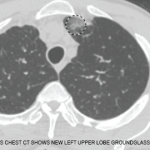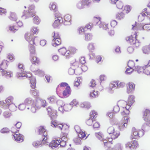7. ANCA Vasculitis & Serum Interleukin 7
Abstract 2375: Fukui et al.10
Interleukin (IL) 7 plays a critical role in the lymphocyte life cycle. IL-7 stimulates hematopoietic stem cells to differentiate into lymphoid progenitor cells, and stimulates the production of B cells, T cells and NK cells. IL-7 also promotes T cell and NK cell survival.
In this study, serum IL-7 was measured in 60 patients with either GPA or MPA and 101 healthy control patients.
Serum levels of IL-7 correlated with the Birmingham Disease Activity Score (Spearman’s rank correlation coefficient 0.28, P=0.028). However, there was no association between IL-7 level and ANCA status, clinical diagnosis (i.e., GPA vs. MPA), or clinical outcome (e.g., relapse or death).
The association between IL-7 and ANCA-associated vasculitis was first reported in 2010. McKinney et al. analyzed transcripts from CD8-T cells from patients with either systemic lupus erythematosus or ANCA-associated vasculitis. Their analysis demonstrated that patients with either diagnosis who had poor prognostic features were enriched for transcripts from the IL-7 pathway. The current report indicates that serum IL-7 levels also correlate with the total white blood cell count and C-reactive protein, implying that it may not distinguish active disease from infection, which is where the true clinical need lies. However, this report provides additional confirmation that IL-7 is important to the pathogenesis of ANCA-associated vasculitis.
8. Efficacy & Safety of Benralizumab in EGPA
Abstract L14: Wechsler et al.11
IL-5 is a T cell derived cytokine that controls the production, activation and localization of eosinophils. Mepolizumab is a humanized monoclonal antibody directed against IL-5 that prevents it from interacting with eosinophils. Currently, mepolizumab is the only agent approved by the U.S. Food & Drug Administration (FDA) for the treatment of EGPA. Benralizumab is a monoclonal antibody directed against the alpha chain of the IL-5 receptor. Benralizumab has been approved by the FDA for the treatment of severe eosinophilic asthma and eosinophilic esophagitis. However, whether this agent is also effective for the treatment of EGPA has been less clear.
In the MANDARA study, 140 patients with EGPA were randomized to receive monthly subcutaneous injections with either 30 mg of benralizumab or 300 mg of mepolizumab. All patients were at least 18 years old and had a history of relapsing or refractory disease requiring at least 7.5 mg of prednisone or prednisolone daily. The primary end point was defined as the proportion of patients achieving remission (defined as a Birmingham Vasculitis Activity Score of 0) while taking no more than 4 mg of prednisone or prednisolone daily.



